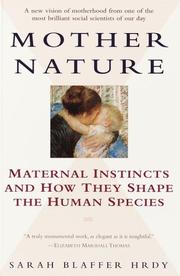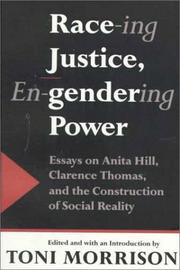| Listing 1 - 10 of 25 | << page >> |
Sort by
|

ISBN: 9780345408938 0345408934 Year: 2000 Publisher: New York, N.Y. Ballantine Books
Abstract | Keywords | Export | Availability | Bookmark
 Loading...
Loading...Choose an application
- Reference Manager
- EndNote
- RefWorks (Direct export to RefWorks)
Philosophical anthropology --- Sociology of the family. Sociology of sexuality --- Affective and dynamic functions --- Mother and child. --- Motherhood --- Natural selection. --- Parental behavior in animals. --- Working mothers. --- Psychological aspects. --- History --- Body --- Psychology --- Sociology --- Book

ISBN: 9780679741459 Year: 1992 Publisher: New York, N.Y. Pantheon Books
Abstract | Keywords | Export | Availability | Bookmark
 Loading...
Loading...Choose an application
- Reference Manager
- EndNote
- RefWorks (Direct export to RefWorks)
Social problems --- Sociology of the family. Sociology of sexuality --- United States of America --- Judges --- African Americans --- Racism --- Sexism --- Selection and appointment --- Social conditions. --- Thomas, Clarence, --- Hill, Anita. --- Essays --- Legal sector --- Sexual intimidation --- Black feminism --- Book
Book
ISBN: 1628923814 1501304828 1628923822 9781628923827 9781628923810 9781628923803 1628923806 9781628923797 1628923792 9781501304828 Year: 2015 Publisher: New York : Bloomsbury Academic,
Abstract | Keywords | Export | Availability | Bookmark
 Loading...
Loading...Choose an application
- Reference Manager
- EndNote
- RefWorks (Direct export to RefWorks)
"We trust our sciences to operate on a plane of objectivity and fact in a world of subjectivity and cultural ideologies, but should we? In The Age of Scientific Sexism, philosopher Mari Ruti offers a sharp critique of the gender profiling tendencies of evolutionary psychology, untangling the insidious threads of various gender mythologies that have infiltrated or perhaps even define this faux-science. Selling stereotypes as scientific facts, evolutionary psychology continually brings retrograde models of sexuality into mainstream culture: it insists that men and women live in two completely different psychological, emotional, and sexual universes, and that they will consequently always be locked in a vicious battle of the sexes. Among these regressive arguments is the assumption that men's sexuality is urgent and indiscriminate, whereas women are "naturally" reluctant, reticent, and choosy a concept constructed to justify masculine behavior, such as cheating, that women have historically found painful. On its most basic level, The Age of Scientific Sexism explores our impulse to "explain" romantic behavior through science: in the increasingly egalitarian gender landscape of our society, why are we so eager to embrace the rampant gender profiling that evolutionary psychology promotes? Perhaps these simplistic gender caricatures owe their popularity, at least in part, to our overly pragmatic society pragmatic society, which encourages us to search for easy answers to complex questions."--Bloomsbury Publishing.
Sex (Psychology) --- Mate selection --- Sexual attraction. --- Sex differences (Psychology) --- Sexism. --- Evolutionary psychology. --- Psychology --- Human evolution --- Sex bias --- Attitude (Psychology) --- Prejudices --- Social perception --- Sex role --- Sex appeal --- Sexiness --- Sexual attractiveness --- Interpersonal attraction --- Courtship --- Dating (Social customs) --- Interpersonal relations --- Man-woman relationships --- Marriage brokerage --- Psychology, Sexual --- Sex --- Sexual behavior, Psychology of --- Sexual psychology --- Sensuality --- Psychological aspects. --- Psychological aspects --- Sexual attraction --- Sexism --- Evolutionary psychology --- Mate selection - Psychological aspects --- Social problems --- Sociology of the family. Sociology of sexuality --- Feminist criticism --- Gender roles --- Love --- Sexuality --- Book --- Sex differences
Book
ISBN: 2912567084 9782912567086 Year: 1999 Publisher: Nantes Pleins feux
Abstract | Keywords | Export | Availability | Bookmark
 Loading...
Loading...Choose an application
- Reference Manager
- EndNote
- RefWorks (Direct export to RefWorks)
De Platon à la parité, en passant par Kant et Beauvoir, le différend des sexes inscrit ses enjeux dans des formes philosophiques. Y a-t-il de l'un, du deux ou ni un ni deux ? Sous la variation des réponses s'imposa longtemps un invariant : il y a du plus et du moins le moins des femmes. La remise en cause de cet invariant est une novation radicale de cette fin de siècle. Elle n'éteint pas mais rouvre autrement la question : qu'en est-il de la femme et de l'homme dans l'être humain ? L'auteur analyse ici les positions de quelques grands philosophes de la tradition et les confronte aux positions contemporaines.
Philosophy and psychology of culture --- Man-woman relationships. --- Relations entre hommes et femmes --- Man-woman relationships --- Female-male relationships --- Male-female relationships --- Men --- Men-women relationships --- Relationships, Man-woman --- Woman-man relationships --- Women --- Women-men relationships --- Interpersonal relations --- Mate selection --- Relations with women --- Relations with men --- Historiographie --- Femmes --- Histoire --- Philosophy --- Equal opportunities --- Theory --- Book --- Sex differences --- Guerre des sexes --- Relation homme / femme --- Philosophie
Book
Abstract | Keywords | Export | Availability | Bookmark
 Loading...
Loading...Choose an application
- Reference Manager
- EndNote
- RefWorks (Direct export to RefWorks)
Marriage --- Mate selection --- huwelijk --- leefvormen --- partnerkeuze --- #BSCH: vak: moraal --- #BSCH: vak: zedenleer --- #GBIB:IDGP --- #GSDBP --- Courtship --- Dating (Social customs) --- Interpersonal relations --- Man-woman relationships --- Marriage brokerage --- 392.3 --- 159.91 --- Schoolbooks - Didactic material --- Sociology of the family. Sociology of sexuality --- Netherlands --- Life-forms --- Book

ISBN: 9780511489785 9780521832960 9781107405974 0511489781 0511166346 9780511166341 0511165218 9780511165214 0511184433 9780511184437 0521832969 9780511164415 0511164416 0521832969 1107148995 9781107148994 1280437480 9781280437489 0511313063 9780511313066 1107405971 Year: 2004 Publisher: Cambridge Cambridge University Press
Abstract | Keywords | Export | Availability | Bookmark
 Loading...
Loading...Choose an application
- Reference Manager
- EndNote
- RefWorks (Direct export to RefWorks)
Computers have changed not just the way we work but the way we love. Falling in and out of love, flirting, cheating, even having sex online have all become part of the modern way of living and loving. Yet we know very little about these new types of relationship. How is an online affair where the two people involved may never see or meet each other different from an affair in the real world? Is online sex still cheating on your partner? Why do people tell complete strangers their most intimate secrets? What are the rules of engagement? Will online affairs change the monogamous nature of romantic relationships? These are just some of the questions Professor Aaron Ben Ze'ev, distinguished writer and academic, addresses in this book, a full-length study of love online. Accessible, shocking, entertaining, enlightening, this book will change the way you look at cyberspace and love forever.
Love --- Man-woman relationships --- Mate selection --- Online dating. --- Internet. --- DARPA Internet --- Internet (Computer network) --- Wide area networks (Computer networks) --- World Wide Web --- Internet dating --- On-line dating --- Web dating --- World Wide Web dating --- Dating (Social customs) --- Courtship --- Interpersonal relations --- Marriage brokerage --- Female-male relationships --- Male-female relationships --- Men --- Men-women relationships --- Relationships, Man-woman --- Woman-man relationships --- Women --- Women-men relationships --- Affection --- Emotions --- First loves --- Friendship --- Intimacy (Psychology) --- Computer network resources. --- Relations with women --- Relations with men --- Internet --- Computer network resources --- Amour --- Relations entre hommes et femmes --- Choix du conjoint --- Ressources Internet --- Sociology of the family. Sociology of sexuality --- Computer architecture. Operating systems --- Health Sciences --- Psychiatry & Psychology --- Love - Computer network resources --- Man-woman relationships - Computer network resources --- Mate selection - Computer network resources --- Dating (Social customs) - Computer network resources --- Relationships --- Seduce --- Book

ISBN: 9053508880 Year: 2000 Volume: 2 Publisher: Leuven Garant
Abstract | Keywords | Export | Availability | Bookmark
 Loading...
Loading...Choose an application
- Reference Manager
- EndNote
- RefWorks (Direct export to RefWorks)
Social stratification --- Sociology of education --- Europe --- Educational equalization --- School choice --- 732 Onderwijsparticipatie --- #A0103A --- Choice of school --- Parents' choice of school --- School, Choice of --- Schools --- Education --- Educational inequality --- Equal education --- Equal educational opportunity --- Equalization, Educational --- Affirmative action programs in education --- Social aspects --- Selection --- Aims and objectives --- Sociale stratificatie --- Sociologie van het onderwijs --- Europa --- Onderwijs --- Schoolloopbaan --- Schoolkeuze --- Sociale uitsluiting --- Educational equality --- Educational equity --- Equality of education --- Equity, Educational --- Inequality, Educational --- Opportunity, Equal educational --- Crisis --- Cultuur --- Opvoeding --- Pedagogiek --- Statistische gegevens --- Sport --- Equal opportunities --- Social inequality --- Book
Book
ISBN: 9789021433981 Year: 2008 Publisher: Amsterdam Em. Querido's Uitgeverij BV
Abstract | Keywords | Export | Availability | Bookmark
 Loading...
Loading...Choose an application
- Reference Manager
- EndNote
- RefWorks (Direct export to RefWorks)
In dit pamflet vuurt Kristien Hemmerechts haar pijlen af op het seksisme en het seksueel geweld waarvan de samenleving doordrongen is zonder dat we het vaak zelf nog bewust merken. Zij illustreert dit onder meer met fragmenten uit de literatuur (Kerouac, Nabokov, Coetzee ...) die bol staan van seksistische seksscènes, die uitsluitend vanuit het lustperspectief van de man zijn geschreven.
Sociology of the family. Sociology of sexuality --- Social problems --- Criminology. Victimology --- Man-woman relationships --- Sex crimes --- Abuse, Sexual --- Sex offenses --- Sexual abuse --- Sexual crimes --- Sexual delinquency --- Sexual offenses --- Sexual violence --- Crime --- Prostitution --- Female-male relationships --- Male-female relationships --- Men --- Men-women relationships --- Relationships, Man-woman --- Woman-man relationships --- Women --- Women-men relationships --- Interpersonal relations --- Mate selection --- Relations with women --- Relations with men --- Literature --- Sexism --- Sexually transgressive behavior --- Points of view --- Book

ISBN: 0742531511 0742531503 9780742531512 Year: 2004 Publisher: Totowa Rowman & Littlefield
Abstract | Keywords | Export | Availability | Bookmark
 Loading...
Loading...Choose an application
- Reference Manager
- EndNote
- RefWorks (Direct export to RefWorks)
As part of the Readings in Bioethics series, this volume collects critical essays by leading scholars on reproductive technologies, abortion, in vitro fertilization, prenatal diagnosis, and cloning.Over a decade ago the field of bioethics was established in response to the increased control over the design of living organisms afforded by both medical genetics and biotechnology. Since its introduction, bioethics has become established as an academic discipline with journals and professional societies, is covered regularly in the media, and affects people everyday around the globe. In response to the increasing need for information about medical genetics and biotechnology as well as the ethical issues these fields raise, Sheed & Ward proudly presents the Readings in Bioethics Series. Edited by Thomas A. Shannon, the series provides anthologies of critical essays and reflections by leading ethicists in four pivotal areas: reproductive technologies, genetic technologies, death and dying, and health care policy. The goal of this series is twofold: first, to provide a set of readers on thematic topics for introductory or survey courses in bioethics or for courses with a particular theme or time limitation.Second, each of the readers in this series is designed to help students focus more thoroughly and effectively on specific topics that flesh out the ethical issues at the core of bioethics. The series is also highly accessible to general readers interested in bioethics. This volume collects critical essays by leading scholars on reproductive technologies, abortion, in vitro fertilization, prenatal diagnosis, and cloning. Included in this volume are David Adamson, James P. Toner, Thomas A. Shannon, Bonnie Steinbock, Laura A. Schieve, Richard J. Paulson, G. Pennings, Thomas H. Murray, Lori B. Andrews, J. M. Phillips.
Reproductive technology --- Reproductive Techniques --- ethics --- reproductieve technologie (voortplantingstechnologie, medisch begeleide voortplanting, MBV, artificiële voortplanting, kunstmatige voortplanting) --- sekseselectie (geslachtsselectie) --- aids (HIV) --- kloneren (klonen) --- Assisted reproduction --- Reproduction --- Biotechnology --- ethics. --- technique de reproduction (technique de procréation, procréation médicalement assistée, PMA, assistance médicale à la procréation, AMP, procréation artificielle) --- sélection de sexe (choix du sexe) --- sida (VIH) --- clonage --- Technological innovations --- General ethics --- Gynaecology. Obstetrics --- Algemene ethiek --- Gynaecologie. Obstetrica --- ART (Assisted reproductive technology) --- Assisted reproductive technology --- Reproductive techniques --- Reproductive technology - Miscellanea --- Reproductive Techniques - ethics --- Ethics --- Book --- Courses
Book
ISBN: 9780745671079 0745671071 Year: 2012 Publisher: Cambridge Polity
Abstract | Keywords | Export | Availability | Bookmark
 Loading...
Loading...Choose an application
- Reference Manager
- EndNote
- RefWorks (Direct export to RefWorks)
Few of us have been spared the agonies of intimate relationships. They come in many shapes: loving a man or a woman who will not commit to us, being heartbroken when we're abandoned by a lover, engaging in internet searches, coming back lonely from bars, parties, or blind dates, feeling bored in a relationship that is so much less than we had envisaged - these are only some of the ways in which the search for love is a difficult and often painful experience. Despite the widespread and almost collective character of these experiences, our culture insists they are the result of faulty or insufficiently mature psyches. For many, the Freudian idea that the family designs the pattern of an individual's erotic career has been the main explanation for why and how we fail to find or sustain love. Psychoanalysis and popular psychology have succeeded spectacularly in convincing us that individuals bear responsibility for the misery of their romantic and erotic lives. The purpose of this book is to change our way of thinking about what is wrong in modern relationships. The problem is not dysfunctional childhoods or insufficiently self-aware psyches, but rather the institutional forces shaping how we love. The argument of this book is that the modern romantic experience is shaped by a fundamental transformation in the ecology and architecture of romantic choice. The samples from which men and women choose a partner, the modes of evaluating prospective partners, the very importance of choice and autonomy and what people imagine to be the spectrum of their choices: all these aspects of choice have transformed the very core of the will, how we want a partner, the sense of worth bestowed by relationships, and the organization of desire. This book does to love what Marx did to commodities: it shows that it is shaped by social relations and institutions and that it circulates in a marketplace of unequal actors. -- Publisher description.
Love --- Interpersonal relations --- Man-woman relationships --- Mate selection --- Human relations --- Interpersonal relationships --- Personal relations --- Relations, Interpersonal --- Relationships, Interpersonal --- Social behavior --- Affection --- Psychological aspects. --- Social aspects. --- Courtship --- Dating (Social customs) --- Marriage brokerage --- Social psychology --- Object relations (Psychoanalysis) --- Emotions --- First loves --- Friendship --- Intimacy (Psychology) --- Interpersonal attraction. --- Social influence. --- Love. --- Psychological aspects --- Social aspects --- Developmental psychology --- Affective and dynamic functions --- Primary groups --- Sociology of the family. Sociology of sexuality
| Listing 1 - 10 of 25 | << page >> |
Sort by
|

 Search
Search Feedback
Feedback About UniCat
About UniCat  Help
Help News
News